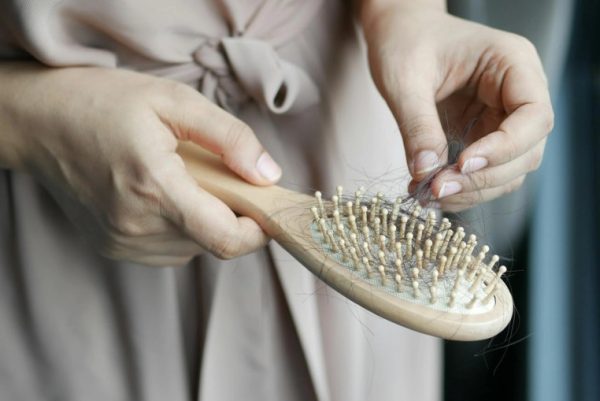
Reasons For Hair Loss During Menopause And How To Take Care
Menopause brings many changes to the body, including shifts in hair growth and texture. Many women notice thinning hair, increased hair fall, and slower regrowth during this phase. Understanding the causes of menopause-related hair loss and taking proactive steps can help maintain hair health.
Why does menopause cause hair loss?
The primary reason for hair loss during menopause is hormonal imbalance. Two hormones estrogen and progesterone, which help hair grow and stay in place longer, start declining during menopause. As these hormone levels drop, hair follicles shrink, leading to:
- Thinning hair (especially at the crown or part line)
- Slower hair growth
- Increased hair fall
At the same time, androgens (male hormones like testosterone) may become more dominant, which can contribute to androgenic alopecia or female pattern baldness. Androgens can cause hair follicles to shrink, resulting in finer and weaker hair.
Other contributing factors include:
- Stress: Increased cortisol levels can slow hair growth.
- Nutritional deficiencies: Lack of essential nutrients like iron, biotin, and omega-3s can weaken hair.
- Genetics: If your family has a history of female pattern baldness, you may be more prone to hair thinning.
- Thyroid issues: Menopause can trigger thyroid imbalances, which may cause hair loss.
How to prevent and manage hair loss during menopause? While hair loss during menopause is common, there are ways to slow the process and encourage hair regrowth.
1. Eat a healthy diet: A nutrient-rich diet can strengthen hair follicles and support growth:
- Protein: Hair is primarily made of keratin, a type of protein. Include plant-based sources like lentils, quinoa, tofu, and nuts.
- Iron & Zinc: Found in leafy greens, beans, and pumpkin seeds, these minerals help prevent excessive shedding.
- Omega-3 Fatty Acids: Essential for scalp health, found in flaxseeds, walnuts, and chia seeds.
- Biotin & B Vitamins: Whole grains, avocados, and mushrooms support hair growth and reduce breakage.
- Antioxidants: Found in berries, dark chocolate, and green tea, antioxidants help fight oxidative stress that damages hair follicles.
2. Use gentle hair care products:
- Avoid harsh sulfate and alcohol-based products, as they can strip the hair of natural oils.
- Use a mild, hydrating shampoo with natural ingredients like aloe vera, rosemary oil, or coconut oil.
- Minimize heat styling (blow drying, curling irons) to prevent further hair weakening.
- Limit chemical treatments like dyes, perms, and relaxers.
3. Scalp stimulation and natural remedies:
- Scalp massage: Regularly massaging the scalp with essential oils like rosemary, peppermint, or castor oil can improve circulation and stimulate hair follicles.
- Aloe vera Gel: Applied to the scalp, it soothes irritation and promotes hair growth.
- Green tea rinse: Rich in antioxidants, green tea can reduce hair shedding when used as a rinse.
4. Manage stress and get better sleep: Since stress can increase cortisol levels and accelerate hair loss, it’s important to manage it through:
- Yoga, breathing and meditation: Help reduce stress hormones.
- Regular exercise: Boosts blood circulation, including the scalp.
- Quality sleep: Aim for 7–9 hours to support overall hormonal balance.
5. Consider supplements and treatments:
- Collagen: Improve hair strength and elasticity.
- Saw palmetto: May help block DHT – Dihydrotestosterone -a hormone linked to hair thinning.
- Herbs: Like Rosemary, Amla, Aloe vera, Fenugreek, Hibiscus, Henna, Curry leaves – help in regrowing hair.
- If the hair loss is severe, your doctor might suggest low level laser therapy or hormone therapy to stimulate hair follicle
When to see a doctor? If hair loss becomes severe, consult a dermatologist or endocrinologist. They can check for underlying conditions like thyroid imbalances, iron deficiencies, or other hormonal disruptions.
Menopause related hair loss can be frustrating, but with the right lifestyle changes, hair care routine, and nutrition, you can slow the process and encourage regrowth. Patience is the key most hair regrowth strategies that take a few months to show results.
Image credit: Photo by Towfiqu barbhuiya: https://www.pexels.com/photo/a-woman-removing-hair-from-a-hair-brush-12941394/ (Free to use)
Author: Sumana Rao | Posted on: March 26, 2025
« Why Should We Conserve Water At Home Drinking Alcohol During Pregnancy Poses Serious Threat To Fetus Health »






















Write a comment